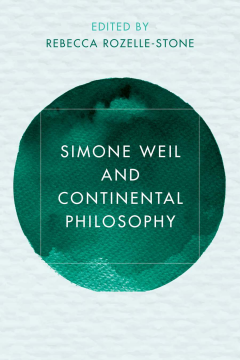
Additional Information
Book Details
Abstract
Simone Weil is an often-overlooked thinker whose insights could radically reshape contemporary discourses on religion, nature, art, ethics, work, politics, and education. This collection of essays situates Simone Weil’s thought alongside prominent Continental thinkers and their philosophical concerns to show the ways in which she belongs to—but also stands outside—some of the major streams of 'Continental discourse', including phenomenology, ethics of embodied disposition and difference, and post-Marxian political thought. For the first time in a major work, intersections between the ideas of Weil and figures such as Nietzsche, Berdyaev, Foucault, Blanchot, Merleau-Ponty, Levinas, Chrétien, Agamben, Fanon, and Rancière are closely examined. The volume is authored by an international team of leading scholars in Weil studies and in contemporary Continental philosophy of religion more broadly. Simone Weil and Continental Philosophy is not only an unprecedented resource for Weil scholars who seek to read her in broader (and more current) philosophical terms, but also an important addition to the libraries of scholars and students of Continental philosophy and theology engaged in thinking about some of the most pressing questions of our time.
For the first time in English, here is a commentary which, like Maurice Blanchot’s, refuses the consolation of hagiography and reads Weil as she read her contemporaries: with the unforgiving ‘indifference to ideas’ which is the true sign of fidelity.
Simone Kotva, Research Fellow and Affiliated Lecturer, University of Cambridge
Rebecca Rozelle-Stone is an Associate Professor of Philosophy and the Director of the Honors Program at the University of North Dakota. She is an active member of the American Weil Society and served as its President from 2014-2016. She is co-editor of The Relevance of the Radical: Simone Weil 100 Years Later (2009) and co-author of Simone Weil and Theology (2013).
This volume does much more than place Weil in conversation with prominent ‘continental philosophers’. Thanks to Rozelle-Stone’s superb framing of the task, each author offers a timely intervention that tests the limits and possibilities of Weil’s complex thought. Students of Weil will certainly benefit, but so will (future) students of philosophy wherever their starting point.
Ian Clausen, Arthur J. Ennis Postdoctoral Fellow in the Humanities, Villanova University
Rozelle-Stone (Univ. of North Dakota) set out to address a gap in the scholarship regarding Simone Weil (1909–43), and she succeeds admirably. The work of both well-known scholars and rising stars, the 12 essays in this remarkable volume consider Weil’s thought alongside Continental philosophy. Readers will appreciate the ways in which Weil is put in conversation with some of the 20th-century’s key thinkers—Blanchot, Agamben, Merlau-Ponty, et al. Interest in Weil’s thought has increased in recent years, and this volume will be warmly welcomed not only by Weil scholars but also by those interested in Continental philosophy, philosophy of religion, political theory, ethics, and religious studies.
Summing Up: Highly recommended. Upper-division undergraduates through faculty.
Rozelle-Stone is a gifted Weil scholar who has put together a beautiful collection of essays linking Simone Weil to several generations of continental philosophers. The volume’s contributors share a deep familiarity with thinkers and movements that belong in any serious conversation about Weil. They remedy a neglected area of scholarship and draw productive contrasts between Weil and her continental counterparts.
Ann Pirruccello, Professor of Philosophy at The University of San Diego
Table of Contents
| Section Title | Page | Action | Price |
|---|---|---|---|
| Simone Weil and Continental Philosophy | Cover | ||
| Contents | vii | ||
| Introduction: Attending to the Outlaw | 1 | ||
| Part I: Transcendental and Embodied Crossings | 11 | ||
| 1 Weil’s Boat: On Becoming and Being | 13 | ||
| 2 “Strangely Surprised”: Maurice Blanchot on Simone Weil | 37 | ||
| 3 Decreation and the Creative Act: Simone Weil and Nikolai Berdyaev | 51 | ||
| 4 Recreating the Creature: Weil, Agamben, Animality, and the Unsaveable | 69 | ||
| Part II: Attentive Ethics | 87 | ||
| 5 Attention and Expression: Prescriptive and Descriptive Philosophy in Weil and Merleau-Ponty | 89 | ||
| 6 Levinas and Weil: Ethics after Auschwitz | 105 | ||
| 7 Compassion, Consolation, and the Sharing of Attention | 121 | ||
| 8 Simone Weil and the Problem of Fatigue | 143 | ||
| Part III: Emancipatory Politics | 165 | ||
| 9 Simone Weil’s Analysis of Oppression: From La Boétie to the Neoliberal Present | 167 | ||
| 10 The Training of the Soul: Simone Weil’s Dialectical Disciplinary Paradigm, A Reading alongside Michel Foucault | 187 | ||
| 11 “To Love Human Beings insofar as They Are Nothing”: Deracination and Pessimism in Weil | 205 | ||
| 12 Weil and Rancière on Attention and Emancipation | 223 | ||
| Bibliography | 241 | ||
| Index | 253 | ||
| About the Authors | 259 |
